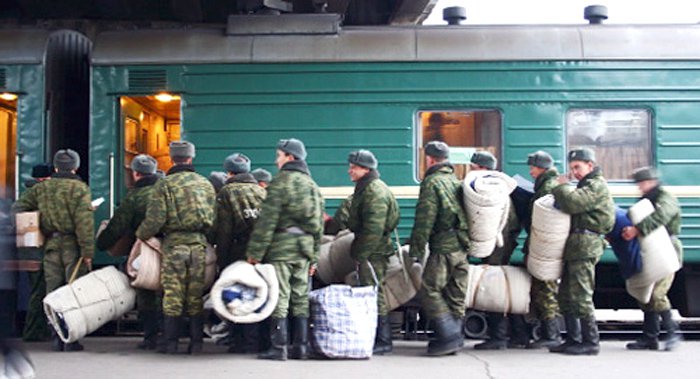
Serdyukov Confirms Long-Term Dependence on Dwindling Military Conscription
Publication: Eurasia Daily Monitor Volume: 9 Issue: 193
By:

Following a relentless period of high-profile military exercises, testing and showcasing elements of the reform of the Russian Armed Forces, senior officials had to face the numerical reality of the tough task of drafting young men to serve in the military. Four years after launching a controversial and systemic reform of the old system, adopting a brigade-based structure for the Ground Forces, downsizing the officer corps, forming a new system of strategic commands and promising better times ahead for military personnel, the defense ministry leadership has admitted that it simply cannot afford to move toward an all-volunteer force (RIA Novosti, October 7).
Consequently, the Russian military press is again widely covering the deep-rooted problems in the biennial draft to bring 18–27-year-old conscripts into the Armed Forces to serve for 12 months. Not only are the figures depressing reading for the defense ministry, but the staggering scale of the health issues and draft dodging among the declining recruitment pool suggests that the “permanent readiness” brigades may be undermanned by at least 30 percent (Interfax, October 15; Krasnaya Zvezda, October 9; Nezavisimoye Voyennoye Obozreniye, October 5).
While Western and Russian military analysts will find little that is new in these developments, the moribund manning policy advocated by Defense Minister Anatoliy Serdyukov cannot be considered as anything other than a failure of the core goals of the reform process. Despite aiming to create “permanent readiness brigades,” it has long been clear that there are significant gaps between the public claims around the “new look” for the Armed Forces and the real level of manning within the units. Equally, although both Serdyukov and the Chief of the General Staff, Army-General Nikolai Makarov, have promised to gradually increase the numbers of contract personnel (kontraktniki) to 450,000 by 2016, which seemed to mark a trend toward gradual professionalization of the military, the system of mixed-manning (kontraktniki and conscripts) appears to be the long-term model in the absence of viable policy alternatives (Nezavisimoye Voyennoye Obozreniye, October 5).
In an interview with Itogi on October 15, Serdyukov explained that a professional army in Russia is not an affordable option, though Russian military economists and other specialists have questioned the “unaffordable” argument often used by those wishing simply to preserve or defend the draft. Serdyukov stated: “As defense minister, I would undoubtedly like the Armed Forces to be staffed 100 percent by professionals. But in the foreseeable future we cannot afford this. Therefore, the contract-draft principle of staffing remains the main one for the time being. This will enable us to ensure the full strength level of the troops and prepare resources for mobilization without additional expenditure” (Itogi, October 15). Essentially, the minister publicly declared that neither he nor his ministry have any answers to these problems of military-manpower.
However, first it must be noted that Serdyukov’s reference to using the draft to “ensure the full strength” of the units is highly questionable. The latest fall draft, which commenced on October 1 and will end on December 31, is estimated by independent Russian military experts to result in a shortfall of the required numbers by approximately 30 percent. The official target for the 2012 fall draft is 140,140 or around 15,000 lower than the spring draft (155,570). Although the defense ministry insists that the total number of personnel serving in the Armed Forces is “one million,” expert assessments indicate the real figure is around 700,000 (Nezavisimoye Voyennoye Obozreniye, October 5). Desperate to find ways of securing more recruits Aleksandr Nikitin, Chief of the Main Military Procuracy’s Oversight Directorate, wants draft dodgers to face serious criminal prosecution. Nikitin stated that dodgers currently face only a 500-ruble fine, though there is a two-year custodial sentence. Alternative penalties, including economics measures, have exposed deep division within the Main Military Prosecutor’s Office on the potential ceiling for financial penalties or their likely effectiveness. One proposal from the Duma Committee on Defense, which advocated banning draft dodgers from later entering state service was blocked by Deputy Prime Minister Vladislav Surkov, arguing that such legislation would contravene the Russian Federation constitution (Nezavisimoye Voyennoye Obozreniye, October 5).
On October 5, Olga Kovtun, a member of the Russian Union of Pediatricians, told a medical conference in Moscow that more than half of Russia’s teenagers are unfit for military service. “Sixty percent of teenagers are not subject to military service for medical reasons,” Kovtun said adding that 46 percent of all teenage boys and 60 percent of all teenage girls have reproductive illnesses. The Union of Pediatricians also expressed concern about the death rate among teenagers, which in some parts of the country exceeds the infant mortality rate (Interfax, October 5).
For instance, the 2012 spring draft in Sverdlovsk oblast revealed that 23 percent of draftees had psycho-neurological disorders. Around 20 percent suffered from illnesses in the bone-muscular system. In addition, among the recruits other disorders were reported, and the military commissar’s office noted that the physical training level of those considered tough enough to meet the required standards in the military is “rather low” (Krasnaya Zvezda, October 15).
Serdyukov has failed to demonstrate how the mixed-manning system can yield “permanent readiness” in the new brigade structure. The numbers of personnel serving in the units are lower than official claims, while the quality of conscripts is clearly quite low. From this recruitment pool the defense ministry plans to recruit and train the 450,000 kontraktniki target figure by 2017; yet, in the hiatus, the General Staff is attempting a repair job to the reform by blowing the dust off the old system of forming battalion tactical groups in the brigades.




